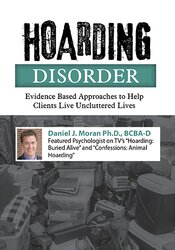
×

Clients who hoard have a million reasons to hold tightly to the collection they’ve amassed. It’s brought them comfort and made them feel safe. It might be useful later. Their memories and very identities are tied to their stuff.
For them, it feels like psychological death to get rid of it – even if it costs them their most precious relationships.
For you, even convincing them it’s a problem can feel insurmountable.
But in the depths of cluttered homes and overwhelmed hearts lie untapped opportunities for healing and transformation.
That’s where this training comes in.
Now in just one day, you can get the specific set of skills needed to work with hoarding, one of the most difficult-to-treat mental health conditions.
Join behavior therapy expert and featured psychologist on TV’s Hoarding: Buried Alive, Dr. Daniel J. Moran, as he shows you how to get inside the minds of clients with hoarding disorder. With specific assessment and treatment tools you can start using right away, you’ll discover how to get beyond the chaos, end ineffective arguments and forced cleanouts that don’t work, and guide your clients towards sustainable change and healing.
Whether you’re working your first case with a hoarder or you’re an experience clinician looking to make your treatment more effective, this training is the perfect fit with everything you need including:
After attending this dynamic training, you’ll have the assessment and treatment tools you need to help your clients move forward and live a healthy, uncluttered life.
Register now!
All members of the PESI, Inc. planning committee have provided disclosures of financial relationships with ineligible organizations and any relevant non-financial relationships prior to planning content for this activity. None of the committee members had relevant financial relationships with ineligible companies or other potentially biasing relationships to disclose to learners. For speaker disclosures, please see the faculty biography.
Continuing education credit information is coming soon for this live webcast.

Daniel J. Moran, PhD, BCBA-D, is the former president of the Association for Contextual Behavioral Science (ACBS), the international ACT organization with over 8,000 members worldwide. He co-authored the first case conceptualization manual for Acceptance and Commitment Therapy entitled ACT in Practice (New Harbinger) and served on the first ACT training committee.
As a recognized ACT trainer in the ACBS community, Dr. Moran has an engaging training style that has led him to be an invited keynote speaker for many events in the last decade. He has also been featured on The Oprah Winfrey Network, TLC, and The Discovery Channel discussing the treatment of many clinical disorders and has published several articles and book chapters, including publications with CBT pioneer Albert Ellis and ACT pioneer Steven Hayes.
Dr. Moran founded the MidAmerican Psychological Institute, a clinic in Chicagoland, and continues to supervise therapists and treat patients in that organization. His passion is for applying the ACT principles in important areas outside of the clinic, such as the boardroom or construction sites. He established Pickslyde Consulting in order to bring mindfulness and value-directed commitment skills to the workplace in order to improve safety, innovation and leadership. Dr. Moran has utilized ACT in work implementations and clinical training sites on six continents and in all 50 of the United States.
For live CE credit, you must watch the live webcast in its entirety at its scheduled time and complete the CE quiz and evaluation within one week. You will have access for 90 days after the program for review.
Please note: There will be a 70-minute lunch and two 15-minute breaks; one in the morning and one in the afternoon. Lunch and break times will be announced by the speaker and at their discretion. A more detailed schedule is available upon request.
Visit our FAQ page at https://www.pesicanada.ca/faq or contact us at https://www.pesicanada.ca/contact-us.
FOUNDATIONS OF HOARDING
Uncovering the Person Who Hoards
Diagnosis
Best-Practices for Home-Visits and Assessments
Interventions and Strategies to Reduce Acquisitions and Plant the Seed of “Letting Go”
EVIDENCE-BASED TREATMENT
Acceptance and Commitment Therapy
Motivational Interviewing
Mindfulness Training
Cognitive Behavioral Therapy
Family & Community Interventions
Satisfaction Guarantee
Your satisfaction is our goal and our guarantee. Concerns should be addressed to info@pesicanada.com.
Please wait ...